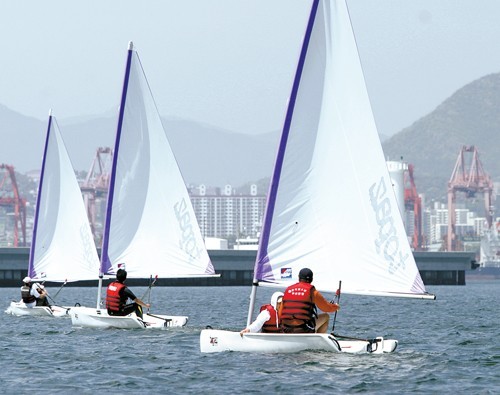Sailing catches on in South Korea
by Kim Young-ju /Sail-World on 15 Aug 2009

Sailing dinghies in Busan Harbour, SW
Sailing as a private leisure activity instead of for waging war, exploring, fishing or cargo hauling is a comparatively recent development of the nineteenth century.
The passion for the sport is still spreading round the world, and in Korea the Korean Maritime University in Busan is in its second year of offering sailing lessons.
Busan, the second largest port city after Seoul, was the host city of the 2002 Asian Games and APEC 2005 Korea, and wants to be the host for the Olympics in 2020.
In the meantime, its citizens are learning to sail. These days on Busan's north harbour, you can sometimes see a fleet of sailing dinghies.
'At first I was afraid but now, sailing on my own, I feel like I’m flying over the sea,' said Jang U-geon, a 38-year-old businessman. 'I’ve been aboard a cruise ship but this is the first time I’ve piloted a dinghy.'
The crews are students at Korea Maritime University, which, like similar organisations in other parts of Korea, has been offering sailing classes since last year, and the lessons are free.
'We’ve been giving lessons with the support of the Busan city government,' said Lee Jae-hyung, a professor at the university. 'Last year, there were 140 students enrolled. This year we’ve been offering intermediate-level courses. We also hold yachting competitions for our student sailors.'
With the growing interest in maritime sports in Korea, there are an increasing number of schools offering classes in yachting.
Whether aspiring sailors live near the Han River in Seoul, Suyeong Bay in Busan, or Tongyeong and Goseong in South Gyeongsang, there is a yachting class for everyone.
Trainee crews must take a four-day training course before they are permitted to go out on their own.
Students begin by learning about the mechanics of boating in the classroom and then they test their knowledge out on the water. Students also learn safety and rescue techniques.
On the first day of the four-day course there is classroom instruction and a yachting simulation. On day two and three, students learn how to check the equipment aboard the vessel and how to handle tacking and gybing. The last day is reserved for practice.
The university also offers intermediate courses, and a two-day weekend sailing yacht class which are not free. Students who complete all three courses can be certified as skippers.
'I was afraid of getting too close to the water, but the experience of riding on the wind and floating above the water was fascinating,' said Kim Na-Rae, 26, one of the 15 students in the KMU class.
'You don’t need much physical strength because yachting uses the power of the wind,' said Kang Shin-beum, a KMU instructor. 'It’s a good way to spend time with family.'
.
If you want to link to this article then please use this URL: www.sail-world.com/60170